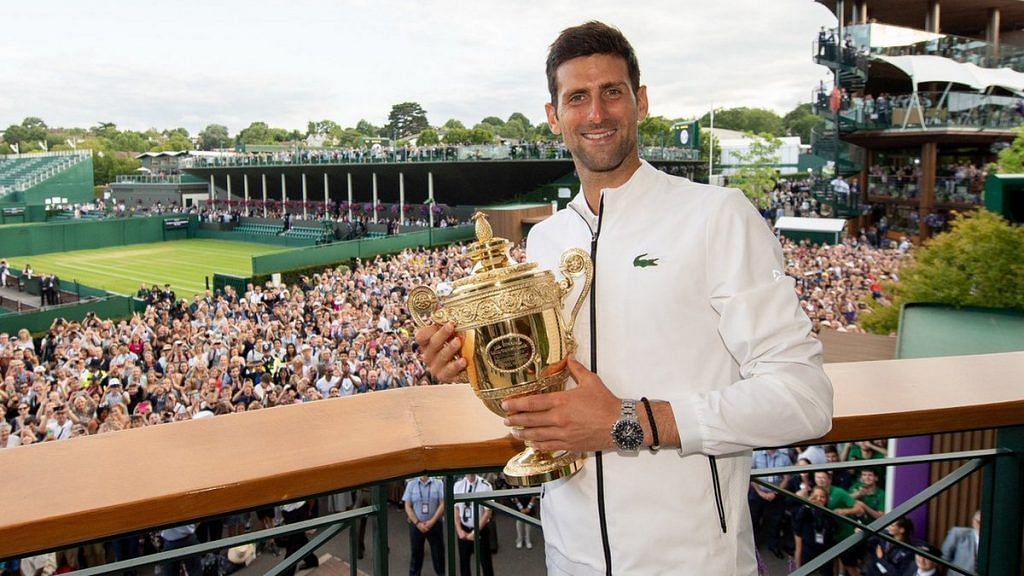Novak Djokovic won the Wimbledon finals Sunday because he deserved to win. Because he was the better player.
Sports is not just an art that exists to please the viewer. For that, we have cinema, music and paintings. Sports is a competition, where winning matters more than anything else, provided rules are not bypassed. And Djokovic, you win, and have been winning more than any other male player for quite some time now.
So, how do you do it? How do you manage to win 4 out of the last 5 slams? How do you manage to emerge victorious in a Wimbledon final when clearly you are not even playing at your best? When your own serve is misfiring and your opponent Roger Federer is making you – the best returner of our generation – look like a commoner? When that opponent, in fact, happens to be one of the best grass-court players ever?
Let me sum it all up, and ask again. How do you, Novak Djokovic, make even that occasional ordinariness prevail over perennial brilliance?
Also read: M.S. Dhoni to Roger Federer – is there a right time to retire from sports?
Here’s my unpopular opinion: Novak, you are not the third wheel who gatecrashed the Roger-Rafa party we had been enjoying for so long. You are the third wheel of a different kind – the one that is at the front of a tricycle and guides and stabilises it. You are like the third dimension, which enhances our cinematic experience.
You may have arrived late to the party, but you have been its real showstopper. You came, you saw (the sheer mastery of Federer and Rafael Nadal) and you conquered (both).
The objectivity of statistics will cede space to the nostalgia of the past for now. People will ignore your better head-to-head against Federer (26-22) and Nadal (28-26). They will discount the fact that you have won 54 big titles (16 slams, 33 masters 1000 and 5 ATP year-end championships), the same as Federer (20 slams, 28 masters 1000 and 6 ATP year-end championships) in far fewer appearances than him. You also have two more big titles than Nadal (18 slams and 34 masters 1000). People will ignore the fact that you have completely dominated the tennis arena since 2011, and lead Federer (20-9, not counting one Djokovic victory due to walkover) and Nadal (21-10) by a long margin in this period.
They will, for now, quote the slam tally to undermine your superiority. They will talk about the elegance in Federer’s shots, the finesse in his on-court movement, the apparent ease of his play – all of which you probably lack in comparison.
But it doesn’t matter. Barring some unfortunate injury, a higher slam tally than all your contemporaries is a foregone conclusion.
Also read: Why maverick Andy Murray defined an era of thrilling tennis (and rivalry)
Granted, a sport cannot completely ignore the viewer. After all, it depends on her for its very survival and sustenance. But it’s also true that the sense of what constitutes a more aesthetic style of play can vary from person to person. And people watch sports not just for its style, but also for the thrill it provides. In tennis, that thrill comes not only when a baseliner competes against a serve-and-volleyer, but also when s/he grunts it out against another.
In sports, as in politics, putting too much emphasis on style can also have serious pitfalls. For one, it is symptomatic of the larger human tendency to collectively suspend all sense of disbelief just because a certain style resonates at a more innate level with everyone. In sports, this can take a form where a player like Cheteshwar Pujara is temporarily dropped from the test team for a more ‘stylish’ K.L. Rahul.
In the long run, however, perceived sense of style will not determine your legacy, Djokovic. Not that you don’t possess a style. Future generations won’t be constrained by the nostalgia of the past. They will also be unwilling to accept popular narratives devoid of evidence. They will undoubtedly look at old tennis videos. While looking at them, some will marvel at your efficiency and precision, some at Nadal’s tenacity and persistence, and some at Federer’s very excellence.
Also read: With Djokovic’s recent wins, is it time to anoint him king of tennis over Federer & Nadal?
But they will also look at the numbers. And these numbers will unambiguously summarise one reality – that in the three-horse tennis derby of our times, you were the first among equals.
